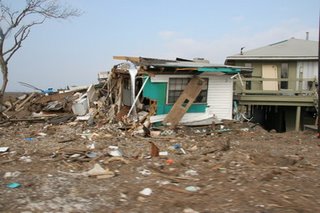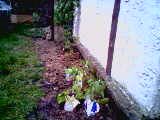We are working in Lacombe, La. Habitat's goal is to make 100 houses by June. They can always use more volunteers.
Monday, July 31, 2006
Sunday, July 30, 2006
House building in Louisiana

It's hard to believe that it has been almost a year since the devastation caused by Hurricane Katrina. Even though the story is not covered as much by the news anymore, there is still so much to do to restore the city, the culture, and most importantly people's lives.
I am off tomorrow to New Orleans to help build a home for someone in Slidell, Louisiana with Habitat for Humanity. Here are some pictures of Slidell right after Hurricane Katrina. Hopefully, it has improved somewhat since then. I will let you know more when I return and I will try to blog during the week if I can to let you know how I am doing.
Here is an interesting slide show presentation by the Washington Post about the disparities in rebuilding neighborhoods. See slideshow.
I am going to try to absorb what I can of Louisiana culture, especially New Orleans jazz. I plan to visit the famous Preservation Hall, but believe it or not the Preservation Hall Band will be playing in New York while I am down South. You would be doing me a great favor if you could hear them. It is a great opportunity to catch traditional New Orleans jazz while its still here. Click here for concert information.Click here to take a virtual tour of Preservation Hall and support New Orleans musicians.
For more information on issues affecting Hurricane Katrina victims and e-mail action you can do to help, visit Katrina Action Network.
Friday, July 21, 2006
Thursday, July 20, 2006
Jefferson and Global Warming

Even Jefferson may have noticed the relationship between high temperatures and hurricanes. In his horticulture diary on July 1, 1792, Jefferson wrote, "This was probably the hottest day ever known in Virginia. on the same day was a violent hurricane from about the capes of Virginia Northwardly. it overset vessels & blew down chimneys & the tops of houses in Philada & N. York, & destroyed a great deal of timber in the country." He seemed interested in temperatures and compared the temperatures at his friends' homes in different areas of Virginia.
1792 July 1. Sunday. The thermometer at Dr. Walker's was this day at 96°. which he says is 3° higher than he ever knew it since he lived at the mountains. there was no thermometer at Monticello; but I have observed when I had one here, that it was generally about 2°. below Dr. Walker's. & mr Maury's. so we may suppose it would have been 94°. It was at 97°. at mr Madison's, in Orange on the same day, and at 99°. in Richmond. this was probably the hottest day ever known in Virginia. on the same day was a violent hurricane from about the capes of Virginia Northwardly. it overset vessels & blew down chimneys & the tops of houses in Philada & N. York, & destroyed a great deal of timber in the country. Read from Jefferson's Garden Book
Scientists concur that rising ocean temperatures lead to stronger hurricanes, but there has been some debate in the scientific community whether global warming is responsible. In June, scientists at the National Center for Atmospheric Research in Boulder, Colorado announced their belief that global warming is the main cause for the rise in ocean temperatures.
Scientists: Warming fuels big hurricanes
Cox News Service
June 23. 2006 6:01AM
WASHINGTON - Global warming, not natural ocean temperature fluctuations, was the main cause of the ocean heat that energized last year's killer hurricanes, scientists at a federally funded climate laboratory said Thursday.
As a result, continued increases in the Earth's temperature likely will lead to more "enhanced hurricane activity" in the years ahead, said climate analysts Kevin Trenberth and Dennis Shea of the National Center for Atmospheric Research in Boulder, Colo.
Hurricanes draw their energy from the ocean, and scientists on both sides of the debate agree that rising Atlantic Ocean temperatures have driven the past decade's increasingly violent hurricanes. Read more...
Read more...
Thomas Jefferson observed and chronicled nature fervently. A Renaissance man of his day, he advocated for the advancement of science. On August 23, 1785, Jefferson wrote to John Jay, "Cultivators of the earth are the most valuable citizens. They are the most vigorous, the most independant, the most virtuous, and they are tied to their country and wedded to it's liberty and interests by the most lasting bands."
Somehow I do not think Thomas Jefferson would approve of George W. Bush's environmental policies.
Monday, July 17, 2006
Coffee Drinkers Fight Global Warming!

Coffee drinkers like me have become aware in recent years of the hardships faced by coffee bean farmers around the world who were living in poverty despite hard labor. Now we are also becoming aware of how the agricultural sector contributes to global warming. Fair Trade Coffee is a way to support the coffee farmers and help them receive fair prices for their crops. Some Fair Trade coffee producers like Dean's Beans are also improving coffee production to reduce CO2 emissions.
Read more about how Fair Trade is helping alleviate poverty.
http://www.transfairusa.org/
Colorado State Fair Trade Research Group
View the trailer of the film, "Buyer Be Fair." http://www.buyerbefair.org/
What better way to start the day with a good cup of coffee that you know helped reduce poverty and CO2 emissions. I'll pay a little more for that!
Green Mountain Coffee is a company that does a lot to help its farmers. http://fairtrade.greenmountaincoffee.com/index.html So does Equal Exhange which also sells fair trade teas and chocolates. http://www.equalexchange.com/
My favorite, however, (and I do not receive any commissions on this) is Dean's Beans. http://www.deansbeans.com Please read how Dean is working to change coffee production to reduce CO2 emissions.
We are working on a program to become a fully carbon neutral company by the end of the year. More about that later. Right now, we are launching a new coffee and concept, NoCO2, to fight Global Warming one cup at a time, and to show our customers that we both contribute to the problem by simple acts every day and that we can also address the issue with simple acts.
We calculated the total carbon load generated by a pound of coffee, from growing, harvesting and processing, to shipping roasting, shipping to you and brewing your coffee at home. This took a long time and required help from Trees for the Future, UPS, World Resources Institute and Smithsonian Migratory Bird Center (thanks to all!). Seventeen pounds of coffee generates about fifty pounds of CO2 into the atmosphere. We also found that one hardwood in the Tropics of Coffee sequesters about fifty pounds of CO2 annually. So we have devised a program to plant one tree in Pangoa Cooperative for every 17 pounds of NoCO2 Peruvian coffee consumed by you, our loyal customers. This is not a joke or a clever, meaningless marketing ploy. It is a real attempt to take our responsibility seriously, and help consumers take theirs seriously as well.
We have begun the project with the Ashaninkas indigenous farmers of Pangoa, whose land was denuded by illegal logging in the 1980's. They have chosen the species, tornillo, which grows about fifty feet tall over time and provides shade, critical migratory bird habitat, and when properly managed provides "social security for our grandchildren" in the form of a harvestable forest product, according to Esperanza Castillo, the manager of Pangoa.
NoCO2 will be available on the web in the medium roast section. Give it a try and see if this hot coffee can help cool the planet.
If you buy Dean's Beans coffee, you can hit two birds with one stone and also support the Labor-Religion Coalition by typing "LCR" into the promotion code before you check out.
Monday, July 10, 2006
Walker Exhibit Provokes Discussion about Race

Sunday, July 09, 2006
Victory Garden in Danger!
Here are some websites on gardening and composting that I hope will help us and anyone else making an attempt at growing their own organic vegetables.
http://www.suite101.com/welcome.cfm/organic_gardening
http://http://www.humeseeds.com/organic1.htm
http://http://journeytoforever.org/compost.html
http://compost.css.cornell.edu/Composting_homepage.html
http://www.compostguide.com/
Tuesday, July 04, 2006
Plant a Victory Garden in Honor of Independence

For 4th of July, my husband and I decided to plant a vegetable garden. "WHAT? A vegetable garden? How patriotic is that?” you think. Well, during World War I and World War II, Americans were urged by the government and industry to plant their own gardens to support the war effort and to increase the country's food supply, thereby offsetting food shortages and rationing. Because of their importance, these gardens were called "victory gardens." It’s ironic to me that these victory gardens have not been encouraged during the current “War on Terror,” particularly since they could play a role in achieving our independence from fossil fuels.
For further history on Victory Gardens, visit http://www.victoryseeds.com/TheVictoryGarden/page2.html
For wonderful examples of these World War I and World War II Victory Garden Posters, check out Ohio Historical Society
Growing our own vegetables is a small action that we can take to reduce global warming and fossil fuel use. Believe it or not, the modern industrial agricultural sector contributes a significant portion of the world's greenhouse gases. According to Edward Goldsmith's 2003 report "How to feed people under a regime of Climate Change," modern industrial agriculture is responsible for 25% of the world's carbon dioxide emisions, 60% of methane gas emissions, and 80% of nitrous oxide."
Furthemore, according to his report,Goldsmith's article is well worth reading and can be found at http://www.culturechange.org/how_to_Goldsmith.html
- The most energy-intensive components of modern industrial agriculture are
the production of nitrogen fertiliser, farm machinery, and pumped
irrigation.
- To produce a ton of cereals or vegetables by means of modern agriculture
requires 6 to 10 times more energy than it does by using sustainable
agricultural methods.
- Oil is required not only to build and operate tractors, to produce and use
fertilizers, but also to package and transport food to markets.
- Transport in general accounts for on eighth of world oil consumption, and
the transport of food is a considerable slice of that.
- 127 calories of energy (aviation fuel) are needed to transport 1 calorie of
lettuce across the Atlantic.
By organically growing our own vegetables, we can help reduce the fuel used in transporting the vegetables and eliminate the nitrous oxide emissions that would result from chemically fertilizing them.
Growing our own vegetables, especially organically, also has wonderful health benefits. According to theveggielady.com,
research shows that organic gardening increases the
antioxidant levels in food and that these antioxidants
- Can lessen joint and muscle pain
- Can reduce inflammation
- Help slow the aging process
- Can prevent or slow the growth of some cancerous tumors
- Delay the onset, or slow the progression, of Type 2 diabetes
For more information about organic gardening and sustainable agriculture, visit
http://www.theveggielady.com/index.htm
http://www.organicconsumers.org/2006/article_259.cfm
http://www.verdant.net/food.htm
http://www.simpleliving.net/ecoliving/default.asp
The next best option for those who do not have the time or energy to plant themselves is to buy locally produced foods. For those living in New York, the site below may help you find local farmers' markets.
If you have more information about how to obtain, locally produced food in other areas, I'd really appreciate it, and love to add it to my blog.
Thanks,
A Suburban Princess
Saturday, July 01, 2006
Today is our Independence Day. Tomorrow can be theirs...
Dear ONE Member:
One year ago, I stood on the stage of Live 8 in
Philadelphia, the biggest concert event in history, talking about something that
was only an idea at the time. It was the idea that, with the stroke of a pen,
eight of the world's leaders could change the future of millions of the poorest
people. Five days later, they did. That moment resulted in unprecedented
commitments to the world's poorest people for debt relief, fair trade, and
better development assistance. July 4th is our Independence Day. It
represents the day our nation started down a path of our own making. Many people
don't realize that development assistance is not about handouts, it's about
providing the means for a country to provide for itself. It's about giving that
country the opportunity to celebrate its own Independence Day. Every three
seconds someone dies of poverty-related disease, but sometimes it's hard to
remember that we are talking about people, not numbers. An actual person —
somebody's daughter, sister, or mother — dies every three seconds just because
she was born on the other side of an invisible line. Together, we can make
statistics like that history.
Thank you,
Will Smith, ONE Campaign
To take action or join the ONE Campaign visit http://action.one.org/ActionSignup.html
--
An Inconvenient Truth

Three years ago my husband and I took a vacation to Glacier Park in Montana. There were no glaciers. My husband was really bummed out, having flown across the country to see them. I teased him endlessly, thinking he had taken the name of the park too literally. After seeing Al Gore's An Inconvenient Truth, I now realize why there were no glaciers in Glacier Park. To understand why check out http://www.climatecrisis.net/thescience/
I owe my husband an apology. I also owe it to future generations to do my part to preserve what is left of the earth's treasures, so they do not disappear the way the glaciers in Glacier park did. I also urge you to help by viewing http://www.climatecrisis.net/takeaction/
With the odd weather we had this week, I couldn't help but remember Al Gore's warnings. Just this week alone massive rains flooded upstate New York, New Jersey, and Pennsylvania, while Texas suffered severe drought. http://www.newsday.com/news/local/state/ny-stbing304800987jun30,0,7639032.story
In Suffolk County Long Island, residents couldn't swim at many beaches because the overflow from the rains caused a rise in the bacteria in the ocean water.
http://www.newsday.com/news/local/longisland/ny-liclos27vr4797456jun27,0,1980032.story
In a separate incident in Nassau county, NY, West Hempstead and Garden City South residents were warned not to use their water supply to drink, cook, bathe, swim, or even brush their teeth because of a chemical that got mixed into the ground water from an oil or gas leak.
http://www.newsday.com/news/local/longisland/ny-limtbe284798604jun28,0,2529552.story
The environmental crisis is hitting home. Every American citizen should see An Inconvenient Truth to start a national dialog about the dangers of neglecting our environment and what we can do about it.
